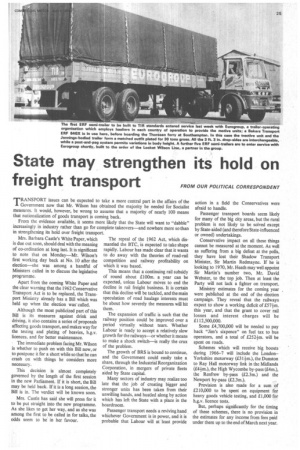State may strengthen its hold on
Page 27

If you've noticed an error in this article please click here to report it so we can fix it.
freighttransport FROM OUR POLITICAL CORRESPONDENT
TRANSPORT issues can be expected to take a more central part in the affairs of the Government now that Mr. Wilson has obtained the majority he needed for Socialist measures. It would, however, be wrong to assume that a majority of nearly 100 means that nationalization of goods transport is coming back.
From the evidence available, it seems more likely that the State will want to "dabble" increasingly in industry rather than go for complete takeovers—and nowhere more so than in strengthening its hold over freight transport.
Mrs. Barbara Castle's White Paper, which is due out soon, should deal with the meaning of co-ordination at long last. It is significant to note that on Monday—Mr. Wilson's first working day back at No. 10 after the election—she was among a handful of Ministers called in to discuss the legislative programme.
Apart from the coming White Paper and the clear warning that the 1962 Conservative Transport Act is to be replaced, the Transport Ministry already has a Bill which was held up when the election was called.
Although the most publicized part of this Bill is its measures against drink and driving, it also contains a series of proposals affecting goods transport, and makes way for the testing and plating of heavies, h.g.v. licences, and for better maintenance.
The immediate problem facing Mr. Wilson is whether to push on with this Bill now, or to postpone it for a short while so that he can crash on with things he considers more necessary.
This decision is almost completely governed by the length of the first session in the new Parliament. If it is short, the Bill may be held back. If it is a long session, the Bill is in. The verdict will be known soon.
Mrs. Castle has said she will press for it to be put straight into the new programme. As she likes to get her way, and as she was among the first to be called in for talks, the odds seem to be in her favour. The repeal of the 1962 Act, which dismantled the BTC, is expected to take shape rapidly. Labour has made clear that it wants to do away with the theories of road-rail competition and railway profitability on which it was based..
This means that a continuing rail subsidy of round about £100m. a year can be expected, unless Labour moves to end the decline in rail freight business. It is certain that this decline will be tackled, and the main speculation of road haulage interests must be about how severely the measures will hit them.
The expansion of traffic is such that the railway position could be improved over a period virtually, without tears. Whether Labour is ready to accept a relatively slow growth for the railways—or whether it means to make a shock switch—is really the crux of the problem.
The growth of BRS is bound to continue, and the Government could easily take a share, through the Industrial Reorganization Corporation, in mergers of private fleets aided by State capital.
Many sectors of industry may realize too late that the job of creating bigger and stronger units has been taken from their unwilling hands, and hustled along by action which has left the State with a place in the boardroom.
Passenger transport needs a reviving hand whichever Government is in power, and it is probable that Labour will at• least provide action in a field the Conservatives were afraid to handle.
Passenger transport boards seem likely for many of the big city areas, but the rural problem is not likely to be solved except by State-aided (and therefore State-influenced or owned) undertakings.
Conservative impact on all these things cannot be measured at the moment. As well as suffering from a big defeat at the polls, they have lost their Shadow Transport Minister, Sir Martin Redmayne. If he is looking to 1970, Mr. Heath may well appoint Sir Martin's number two, Mr. David Webster, to the top job. Then at least the Party will not lack a fighter on transport.
Ministry estimates for the coming year , were published at the end of the election campaign. They reveal that the railways expect to show a working deficit of £574m. this year, and that the grant to cover rail losses and interest charges will be £112,500,000.
Some £4,700,000 will be needed to pay back "Jim's sixpence" on fuel tax to bus operators, and a total of £2524m. will be spent on roads.
Schemes which will receive big boosts during 1966-7 will include the London– Yorkshire motorway (£314m.), the Dunston to Ray Hall motorway link in the Midlands (£41m.), the High Wycombe by-pass (£4m.), the Renfrew by-pass (£2.3m.) and the Newport by-pass (£2.3m.).
Provision is also made for a sum of £210,000 to be spent on equipment for heavy goods vehicle testing, and £1,000 for h.g.v. licence tests.
But, perhaps significantly for the timing of these schemes, there is no provision in the estimates for any income from fees paid under them up to the end of March next year.












































































































